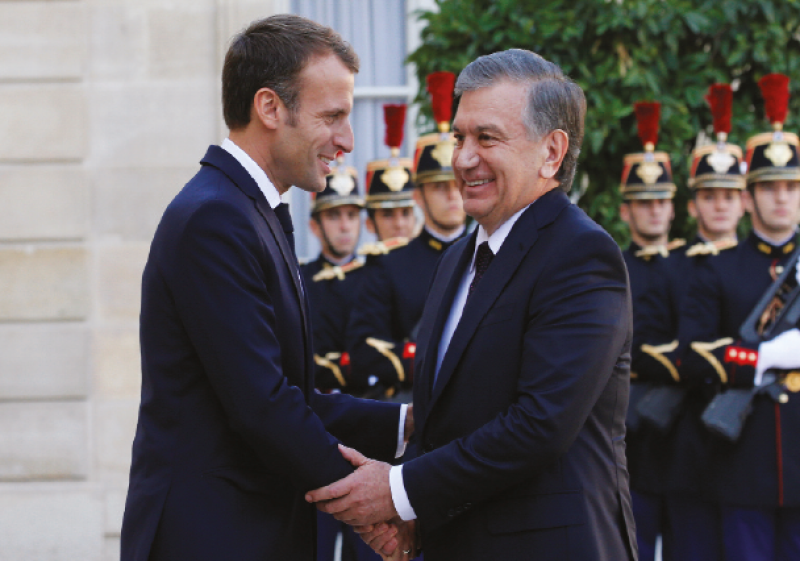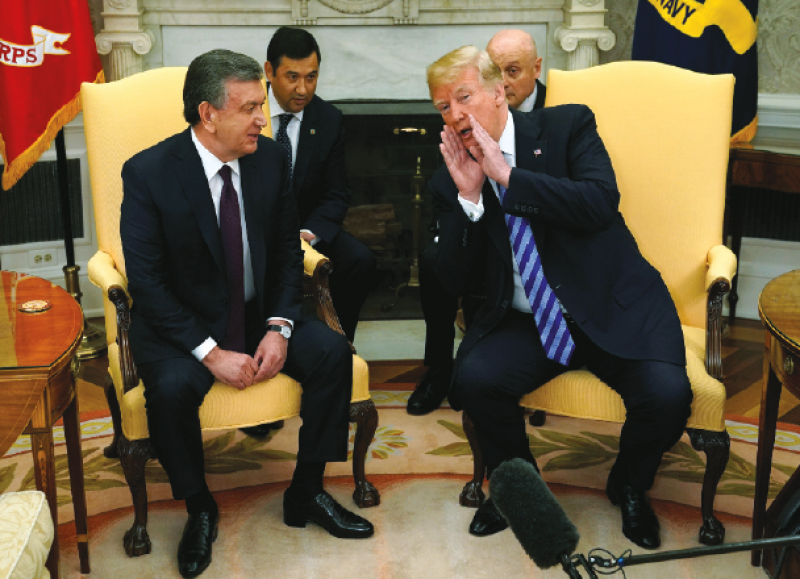
The Republic of Uzbekistan has spent most of the past four decades doing precious little. For most of the 1990s and 2000s it was all but economically inactive, while to most Western investors, if it had an identity, it was as a flyover state on the way to the likes of Kazakhstan. According to World Bank data, Uzbekistan’s economy was actually smaller in 2007 than it was in 1991, the year it declared independence from the withered husk of the Soviet empire.
Life began to change in 2016 with the passing of former president Islam Karimov, a figure of stability in his early years who came to rule with an iron fist, jailing opponents and keeping foreigners, including most potential investors, at arm’s length. Karimov was replaced by Shavkat Mirziyoyev, prime minister since 2003.
But despite being part of the old, entrenched system, Mirziyoyev appears to be cut from a different cloth. Once president, he freed political prisoners, sacked many of Karimov’s cronies, and promoted capable, forward-thinking technocrats. A “virtual reception hall” was launched, allowing normal Uzbeks to vent their spleen against the authorities online without fear of repercussion. Millions did so in the first few months.

But there has been no Uzbek spring: reforms have been progressive and steady, not sharp and jolting. Travel restrictions were eased, and in September 2017, Mirziyoyev lifted exchange restrictions on the Uzbek som, devaluing the currency by 90%, a decision that at a stroke eliminated one of the key obstacles to foreign investment and trade. He made all the right noises, promising to champion the private sector and break up state monopolies, and to convince leading corporates to issue shares and bonds and sell them to global investors.
By any measure, the process appears to be working. In its latest World Economic Outlook, published in April 2019, the IMF tipped economic output to expand by 5% in 2019 and 5.5% in 2020, rising to 6% by the middle of the 2020s. In a credit opinion published by Moody’s in February 2019, the ratings agency highlighted the country’s “robust growth potential”, underpinned by “positive demographic trends and relatively low government debt”. It said the economy would continue to post “strong nominal GDP growth”and a modest budget deficit of around 1.5%.
“Uzbekistan is on an exciting path to opening up its economy,” Alkis Vryenios Drakinos, head of the resident office in Uzbekistan at the EBRD, tells GlobalMarkets. “It welcomes investors that are ready to take a long-term approach”, and who look for “impressive reforms, macro-economic robustness, a young and growing population and an economy rich in natural resources.”
Debt issuance
In June 2018, the International Finance Corporation, the private sector arm of the World Bank, issued UZS80bn ($9.5m) worth of two-year bonds on the London Stock Exchange. The so-called ‘Samarkand’ bonds were a global first for the country and the multilateral, with the proceeds used to boost funding to local SMEs.

Another key moment in Uzbekistan’s development came in February 2019, when it secured an international credit rating, and printed $1bn worth of Eurobonds — the state’s first foray into the international capital markets. More sovereign prints are set to follow, with Uzbekneftegas, the dominant local oil and gas firm, looking to sell debt to international investors before the end of the year.
In its first quarter 2019 investor presentation, Tashkent-based Ipak Yuli Bank pointed to three key reforms helping to drive change and boost growth. Liberalising foreign currency rules made it easier, the bank said, to repatriate profit, while lower business taxes encouraged firms to reinvest. Finally, efforts to slash red tape created a more responsive government willing to support inward foreign investment.
In the World Bank’s 2019 Doing Business Rankings, Uzbekistan ranked 76th, up from 87th in 2017, the first full year of Mirziyoyev’s rule, and 141st in 2015, the year before he was elected and sworn in as president. In its latest survey, the bank pointed to a host of positive moves made by the new administration, from strengthening the rights of minority investors, to making it easier to pay taxes and trade across borders.
In his first year in office, Mirziyoyev chose to stay close to home, shoring up power in Tashkent and meeting friends and allies around the region. The new leader travelled to Turkmenistan and Tajikistan — brokering a peace deal with the latter that included the re-opening of the shared land border — and visited Kazakhstan on no fewer than four occasions. Despite having a smaller population, Kazakhstan, with president Nursultan Nazarbayev at its helm until he left office in March 2019, spent decades courting global investors, sucking foreign capital into energy and mining projects.
Natural and human resources
Kazakhstan and its canny former president can act as handy benchmarks for, respectively, Uzbekistan and Mirziyoyev. The two sovereigns are very similar to one another. They are blessed with an overwhelmingly young population keen to build better, richer lives. Ipak Yuli Bank reckons that 72% of Uzbekistan’s 33m people are under the age of 40. Both are also incredibly rich in natural resources, including oil and gas, gold and silver, and copper and cotton. Uzbek officials have estimated the total value of all of the country’s mineral and energy resources at $5.7tr.
It is surely only a matter of time before the world’s energy and natural resources giants strike profitable commercial joint ventures with leading local groups. The EBRD’s Drakinos reckons reforms will transform Uzbekistan into “a more open, mainstream and private sector-oriented economy that is already well positioned to become one of the most most advanced in the region”.

Whether it has the capacity to transition into a middle or higher-income market, digitally and financially innovative and with a strong manufacturing base, remains to be seen. “Mercedes-Benz and [the Norwegian telecoms firm] Telenor found it very challenging to invest here, and those memories are still fresh,” notes Gunter Deuber, head of economics, fixed income and foreign exchange research at Raiffeisen Bank International. “It will take time to turn that [reputation] around, so I don’t see sizeable FDI flowing in — first we will need to see more progress on opening up.”
Yet Mirziyoyev is clearly keen to continue to forge ahead with reforms. In the final years of Karimov’s life, Uzbekistan was a virtual no-go zone for foreign corporates and capital. After peaking at $1.6bn in 2010 and 2011, according to data from UNCTAD, inbound FDI fell off a cliff, tumbling to $133m in 2016, and $96m in 2017. More promising news arrived in 2018, when FDI rebounded to $255m, scattered across 13 greenfield projects.
Global tour
That may explain why the president has emerged in the past 18 months as something of a globe-trotter. In the second half of 2018, he visited Russia, the United States, Saudi Arabia and also China, to attend the second Belt & Road Forum, held in Beijing in November. Uzbekistan is integral to the Belt & Road Initiative, China’s grand plan to redraw the world trade map in its image. All overland trade routes between Beijing and Europe that pass north of Afghanistan and south of the atrophied body of the Aral Sea, have to pass through Uzbekistan.

Belt & Road capital has not been welcomed everywhere with open arms. Soft loans from China’s twin development banks, China Exim Bank and China Development Bank, have, critics say, caused endemic indebtedness in a host of emerging states, from Tajikistan to Sri Lanka and Pakistan to Djibouti.
But Uzbekistan, so far at least, has been amenable to Beijing’s overtures, and more than happy to channel mainland money into infrastructure projects. China has helped to electrify a 355km rail line linking Bukhara with Misken, and co-financed a highway connecting Tashkent with Turkmenbashi on the Caspian Sea.
Mirziyoyev has continued this year to operate as a one-man international investment bureau. In February, he visited the United Arab Emirates, signing $10bn worth of deals with the sovereign and with the Abu Dhabi-based Mubadala Investment Company, spanning a number of sectors ranging from renewable energy to infrastructure to agriculture. Another key trip, scheduled for the second half of 2019, will see the president visit Belgium, with the aim of strengthening sovereign relations with the European Union. In February, Uzbekistan held the first round of negotiations in Tashkent, on an Enhanced Partnership and Cooperation Agreement.
Road to reform
But while much has already been achieved over the past two years, this is a country that is by any measure still at the beginning of a very long sovereign journey. Four decades of self-imposed isolation is not going to be negated overnight. Scroll back to the start of the decade, and you find a country ranked 172nd in Transparency International’s Corruption Perceptions Index, ahead of just four other nation states, including Afghanistan and Somalia. It has inched up steadily ever since, but it was still ranked 158th in 2018, sandwiched between Mozambique and Zimbabwe.
Uzbekistan’s capable president is making all the right moves: visiting old friends and making new ones; opening once-closed borders; securing credit lines from China’s big development banks; and seeking to strike economic and co-operation partnerships with Europe.
But Deuber’s point about Western corporate reservations remains important and relevant. In 2014, a Swiss money-laundering investigation targeting four Uzbek men with links to the daughter of then-president Karimov, also ensnared a Swedish telecoms firm and, indirectly, Telenor. It eventually cost the chairman of the Norwegian telecoms firm his job. Events like these are not quickly forgotten by Western CEOs. They linger for years in the collective corporate memory.

Nor is the overhaul of an economy kept isolated from the world for decades an inevitable and foregone conclusion. Uzbekistan has little experience of trading with the outside world, let alone dealing with the labyrinthine complexity of adhering to the ever-evolving tenets and rules of Western-style corporate and financial governance. There will inevitably be growing pains as a conservative country used to following its own, self-penned rule book, learns to adapt.
The road to reform in any country is strewn with obstacles, whether economic, financial, societal, political — or all of the above. Mirziyoyev’s route to power was linear and, as these things go, unusually seamless and painless. But he wasted no time in removing individuals close to his predecessor from positions of power. They may be gone, but will they have forgotten the manner of their departure?
Little wonder Moody’s, in its February credit note, warned the biggest threat to future stability stems from political risks that “stem from potential opposition to the reform programme in the face of short-term economic and social costs”. There are trials and tests ahead for an economy still finding its feet and its identity as it opens up to the outside world. But they are challenges that are worth facing, and which, moreover, will only make this resource-rich market stronger.
